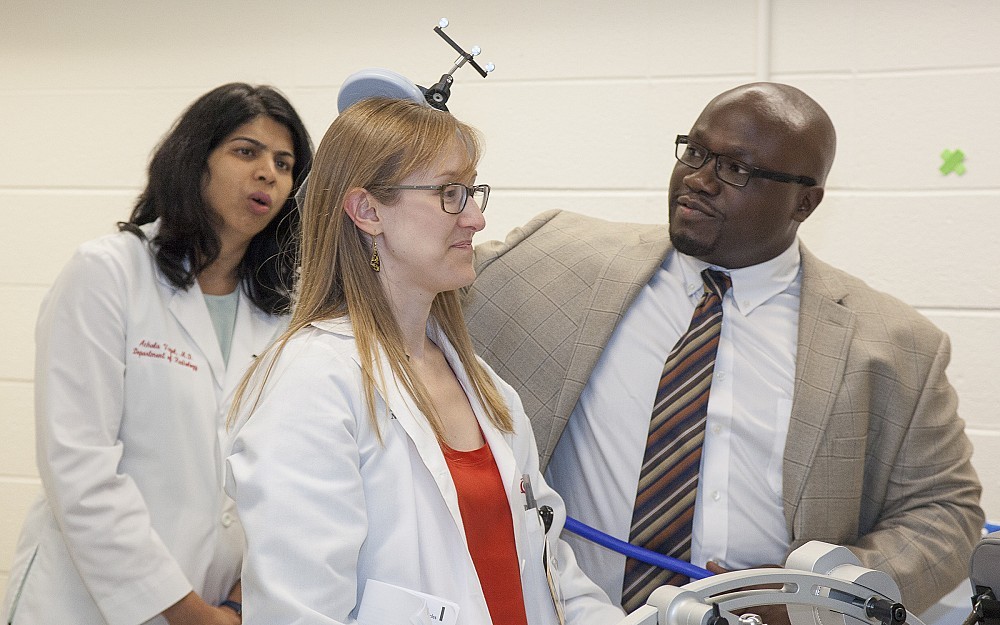
New Human Lab at UC Brings Collaborative Model to Neurorecovery
Move over microscopes and test tubes, and make room for treadmills and simulators. On Sept. 1, 2017, University of Cincinnati officially opened its new Neurorecovery Laboratory, the first lab in the Medical Sciences Building (Room G-351) to house clinical trials. This unique comprehensive research space dedicated to translational and clinical studies aims to bring innovative recovery research to patients with neurological injuries.
The new space fosters cross-specialty collaboration with four departments across three colleges: Neurology and Rehabilitation Medicine in the College of Medicine, Rehabilitation Sciences and Communication Sciences and Disorders Departments within the College of Allied Health Sciences, and the College of Nursing. Co-directors of the laboratory are Oluwole Awosika, MD (Medicine) and Pierce Boyne, DPT and Aimee Dietz, PhD (Allied Health).
There are at least eight ongoing studies using the lab, focused on stroke recovery interventions to manage aphasia, reach and grasp, walking and other mobility issues stemming from neurological injury.
"Creation of this lab space was really an interdisciplinary effort. Just a year ago this was a locker room, transformed for our rehabilitation research center efforts, to devise novel and practical therapeutic interventions for stroke, TBI (traumatic brain injury) and spinal cord injury research, says Awosika.
"Whats unique is that this is our first lab of this sort in the MSB facility, which is primarily home to basic research labs. What we really hope to do here is to translate researchfrom basic to clinicaland bring patients from the clinics and rehab centers to this central location to be part of this dynamic research process.
Boyne, a physical therapist, says for years there were separate lab spaces. "Thanks to the long-term efforts of Brett Kissela and Kari Dunning, they really founded this idea to have an interdisciplinary lab we started it out at the Drake Center ( Daniel Drake Center for Post-Acute Care) and now were here at UC, where we can all collaborate in this shared space.
"The main thrust for this lab right now is studies targeting better recovery from stroke, including improved walking ability, arm function and language. One unifying theme underlying all of our current studies is working to better understand how the brain rewires to deal with damage like a stroke and how we can maximize the brains potential for plasticity to facilitate the most meaningful recovery possible, says Boyne. "By working together across disciplines, we can combine the knowledge and perspectives from our different fields to accelerate discovery, answer more fundamental questions about recovery from neurologic disorders and more comprehensively address patients goals.
Brett Kissela, MD, Albert Barnes Voorheis Chair and professor of Neurology and Rehabilitation Medicine at UC College of Medicine, says this collaborative lab space is important for many reasons.
"There is a large focus on stroke, but our intent is to look at all types of brain disease and recovery from it, so TBI, Parkinsons we really hope to make this a platform for all forms of those recovery and research and treatments for neurologic disease and find new ways to help the brain get better, recover and have better quality of life.
"This space really puts us up on the national level along with the grants and research the faculty here are doing.
Dietz, a lab co-director and a speech pathologist whose work focuses on aphasia and language disorders, agrees.
"This was a long time coming and to be able to have a shared space and a shared vision is going to be exciting, she says.
In December 2016, the Oliver Family Foundation made a pledge of $500,000 to the UC Gardner Neuroscience Institute in support of research and care for patients with spinal cord injury, traumatic brain injury, stroke and other neurological disorders. The Oliver Family Neurorecovery Lab Fund will cover gaps in funding between projects, facilitate research and provide for new, leading-edge equipment for the lab.
Related Stories
Preparing students for artificial intelligence in education
May 8, 2025
Laurah Turner, PhD, associate dean for artificial intelligence and educational informatics at the University of Cincinnati's College of Medicine, recently joined the For The Love of EdTech podcast to discuss the usage of personalized learning and AI coaches to enhance educational experiences.
UC lab-on-a-chip devices take public health into home
May 8, 2025
University of Cincinnati engineers created a new device to help doctors diagnose depression and anxiety. The “lab-on-a-chip” device measures the stress hormone cortisol from a patient’s saliva. Knowing if a patient has elevated stress hormones can provide useful diagnostic information even if patients do not report feelings of anxiety, stress or depression in a standard mental health questionnaire.
UC researcher launches app to connect patients to lifesaving...
May 7, 2025
A cardiologist and researcher at UC’s College of Medicine joined the Venture Lab at the 1819 Innovation Hub to launch High Enroll, an app that links clinical trials with willing participants.
